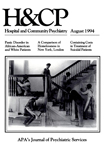Down and Out in New York and London: A Cross-National Comparison of Homelessness
Abstract
This study compared homelessness in New York City and London to examine the relative roles of individual pathology and structural forces in causing homelessness, the effect of sociopolitical and cultural differences on policy decisions toward solving homelessness, and the effect of broader structural forces on service programs for the homeless.
Methods: A review of the scholarly literature and news reports was combined with interviews of staff members and homeless persons associated with various community agencies in London and New York City. Homelessness in the two cities was compared in relation to definition, demography, nonpsychiatric and psychiatric etiological factors, public policy, governmental responses, financial support, service strategies, and the practicalities of securing services and entitlements.
Results and conclusions: The results indicate that charterizations of homelessness as a trait rather than a state reflect the tensions between social justice, public concepts, and a nation's economic resources. The absolute numbers of homeless persons, including those who are mentally ill, primarily reflect structural factors such as the availability of low-cost housing and public benefits. The commonalities that mentally ill homeless persons share with other vulnerable groups generally outweigh their differences. The statutory rights to entitlements may be vitiated in times of shortage, especially for the least capable citizens. in both countries, efforts have been made to use the voluntary sector to serve the homeless, although it has been used much more extensively in Britain.
Access content
To read the fulltext, please use one of the options below to sign in or purchase access.- Personal login
- Institutional Login
- Sign in via OpenAthens
- Register for access
-
Please login/register if you wish to pair your device and check access availability.
Not a subscriber?
PsychiatryOnline subscription options offer access to the DSM-5 library, books, journals, CME, and patient resources. This all-in-one virtual library provides psychiatrists and mental health professionals with key resources for diagnosis, treatment, research, and professional development.
Need more help? PsychiatryOnline Customer Service may be reached by emailing [email protected] or by calling 800-368-5777 (in the U.S.) or 703-907-7322 (outside the U.S.).



